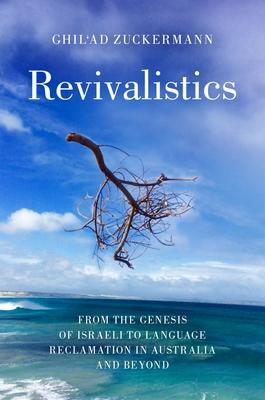In this book, Ghil'ad Zuckermann introduces revivalistics, a new trans-disciplinary field of enquiry surrounding language reclamation, revitalization, and reinvigoration. Applying lessons from the Hebrew revival of the late nineteenth and early twentieth centuries to contemporary endangered languages, Zuckermann takes readers along a fascinating and multifaceted journey into language revival and provides new insights into language genesis.
Beginning with a critical analysis of Israeli-the language resulting from the Hebrew revival-Zuckermann's radical theory contradicts conventional accounts of the Hebrew revival and challenges the family tree model of historical linguistics. Revivalistics demonstrates how grammatical cross-fertilization with the revivalists' mother tongues is inevitable in the case of successful "revival languages." The second part of the book then applies these lessons from the Israeli language to revival movements in Australia and globally, describing the "why" and "how" of revivalistics. With examples from the Barngarla Aboriginal language of South Australia, Zuckermann proposes ethical, aesthetic, and utilitarian reasons for language revival and offers practical methods for reviving languages. Based on years of the author's research, fieldwork, and personal experience with language revivals all over the globe, Revivalistics offers ground-breaking theoretical and pragmatic contributions to the field of language reclamation, revitalization, and reinvigoration.| FindBook |
|
有 1 項符合
Ghil’a的圖書 |
 |
$ 2699 | Revivalistics: From the Genesis of Israeli to Language Reclamation in Australia and Beyond
作者:Zuckermann、Ghil’a 出版社:Oxford University Press, USA 出版日期:2020-05-15 語言:英文 規格:平裝 / 352頁 / 普通級 / 初版  看圖書介紹 看圖書介紹
|
|
|
圖書介紹 - 資料來源:博客來 評分:
圖書名稱:Revivalistics: From the Genesis of Israeli to Language Reclamation in Australia and Beyond
作者簡介
Ghil’ad Zuckermann is Chair of Linguistics and Endangered Languages at the University of Adelaide, Australia. He is a chief investigator in a large research project assessing language revival and mental health, funded by Australia’s National Health and Medical Research Council. He is elected fellow of the Australian Institute of Aboriginal and Torres Strait Islander Studies, board member of the Foundation for Endangered Languages, and President of the Australian Association for Jewish Studies.
|








![2026【補充延伸實務趨勢與議題】觀光資源概要(包括世界史地、觀光資源維護)[華語、外語領隊人員][二十一版](領隊華語人員/外語人員) 2026【補充延伸實務趨勢與議題】觀光資源概要(包括世界史地、觀光資源維護)[華語、外語領隊人員][二十一版](領隊華語人員/外語人員)](https://media.taaze.tw/showLargeImage.html?sc=14100126915)
